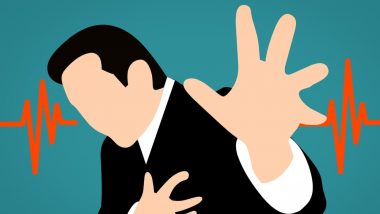In the movies, characters having a heart attack are shown clutching their chest and collapsing to the ground. News flash! Not all heart attacks cause pain. Although pain is one of its biggest signs, a study showed that one-third of people having a heart attack feel no pain! The symptoms of heart attack may vary from person to person. So should you think that jaw pain is something you worry about, read on. On World Heart Day 2018, let’s look at some of the signs of a heart attack.
What’s A Heart Attack?
The human heart is a powerful organ that beats around 100,000 times a day sending blood by the gallons to every single cell in the body. The heart’s purpose is to supply oxygen and nutrients to the body parts through blood and scavenging carbon dioxide and wastes. Without the heart doing its job, the body will be deprived of nutrients and oxygen. But sometimes, when the organ responsible for transporting oxygen is itself deprived, a heart attack can be in the offing. 10 Heart-healthy Foods That You Must Include in You Diet.
In clinical terms, a heart attack is called myocardial infarction and it happens when a part of the heart muscles die due to an inadequate oxygen supply. The body gives off certain signs when there is an impending heart attack. According to Dr Brajesh Kumar Kunwar, Interventional Cardiologist –Hiranandani Hospital, Vashi, some heart attacks are silent, especially if the person is a woman, above the age of 60, is overweight or has diabetes or high cholesterol. “The more risk factors you have, the more you should be worried,” says Dr Kunwar.
What Are The Signs and Symptoms of a Heart Attack?
Chest Discomfort: The commonest sign of a heart attack is chest discomfort, which shows that you may have a blocked artery. The discomfort may manifest as pain, tightness or pressure in your chest. “Everyone has a different word for that feeling. Someone people say it feels like an elephant is sitting on their chest. Others describe a pinching or burning feeling. The discomfort may last longer than a few minutes,” says Dr Kunwar.
You may experience it when you are performing a physical activity or even when you are resting. “But if the spot hurts when you touch it or press it, it may not be a heart attack,” he adds.
Gastric Problems: Gastric disturbances like nausea, indigestion, heartburn, vomiting and stomach pain can sometimes be the sings of a heart attack. Women are more likely to report such symptoms than men. “It’s perfectly possible to have an upset stomach for reasons that have nothing to do with your heart. “But if it occurs with other symptoms, there is a chance it is a heart attack,” says the doctor.
Pain That Spreads to The Arm: A radiating pain in the arm is another major sign of a heart attack, especially if it is on the left side of the body. “If it is a heart attack, the pain starts in the chest and moves outward,” says Dr Kunwar.
Dizziness or Light-headedness: Losing your balance, falling or fainting can be red flags. Bur light-headedness don’t always mean heart attacks. It could also be a result of dehydration or low blood sugar. Swooning suddenly could also mean you stood up too fast. “But if you have been feeling unsteady, it could mean that blood pressure has dropped since your heart cannot pump blood the way it should,” says the cardiologist.
Throat or Jaw Pain: Every pain in the throat or the jaw may not be heart- related. It could be caused by a muscular problem or a cold. Sinusitis can also cause jaw pain. “If the pain or pressure is at the centre of your chest, spreading to your jaw and throat, beware, it could be a heart attack,” says Dr Kunwar. It is important to seek medical attention at this point.
Exhaustion or Fatigue: “Feeling tired or fatigued every time could be a sign of impending heart attack. If you have trouble doing the things you did with ease earlier, make an appointment with the doctor right away” advises Dr Kunwar. Women should be more careful of such signs. 8 Surprising Facts about Heart Diseases in Women.
Snoring: Snoring can be annoying for the ones who have to endure it. But loud snoring that sounds like the person is gasping or choking can point to sleep apnea, where the breathing is stopped for brief moments during sleep. “Sleep apnea can stress out the heart. Your doctor will be able to check whether you have this condition through a sleep study. If you do have it, you may need a continuous positive airway pressure (CPAP) machine to smooth out your breathing,” says the cardiologist.
Sweating: A cold sweat for no specific reason is something to worry about, especially if it happens along with other symptoms. It could be a sign of i an impending heart attack.
Stubborn Cough: Continuous coughing may not always be a cause for concern. But if it has been stubborn, chronic problem that produces white or pink mucous, it could be a sign of heart failure. “This usually happens when the heart can’t keep up with the body’s demands, causing blood to leak into the lungs,” adds the doctor.
Swollen Legs, Feet and Ankles: This is another sign that your heart does not pump blood as effectively as it used to before. When it doesn’t do its job well, blood starts staying back in the veins, causing bloating. Dr Kunwars says that heart failure can also make it difficult for the kidneys to flush-out extra water and sodium from the body.
Irregular Heart Beats: If your heart beats are racing, but you aren’t nervous or excited, beware! It’s normal for your heart to race when you are nervous or excited. But if you think it is recurrent problem, call your doctor now! “In most cases, it is caused by something harmless like caffeine or sleep deprivation. But if it continues, visit the doctor at the earliest,” he warns.
(The above story first appeared on LatestLY on Sep 27, 2018 07:34 PM IST. For more news and updates on politics, world, sports, entertainment and lifestyle, log on to our website latestly.com).













 Quickly
Quickly


